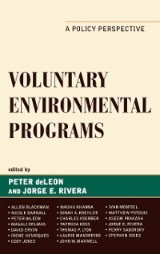Details

Voluntary Environmental Programs
A Policy PerspectiveStudies in Public Policy
|
119,99 € |
|
| Verlag: | Lexington Books |
| Format: | EPUB |
| Veröffentl.: | 03.12.2009 |
| ISBN/EAN: | 9780739133248 |
| Sprache: | englisch |
| Anzahl Seiten: | 316 |
DRM-geschütztes eBook, Sie benötigen z.B. Adobe Digital Editions und eine Adobe ID zum Lesen.
Beschreibungen
Protecting the environment is often not the primary objective of businesses. As the world has become more environmentally aware, the necessity of environmental regulations becomes apparent. Voluntary Environmental Programs: A Policy Perspective examines different approaches to environmental protection in business. Environmental improvements on the part of industry often result from government regulations that command certain action on the part of industry and then control how well they perform. An alternative approach is Voluntary Environmental Agreements (VEA), where firms voluntarily commit to make certain environmental improvements individually, as part of an industry association, or under the guidance of a government entity. For example, many new initiatives targeted towards climate change originate from companies that voluntarily commit to reduce their carbon output or 'footprint.' Voluntary Environmental Programs (VEP) provides an overview of current research on VEPs, looking at issues such as what motivates firms to participate, how a VEP structure affects a company's efficiency and credibility with stakeholders, and who monitors compliance of participants. This current work examines how a firm's environmental performance over time compares with VEP commitments. This book also discusses the particular considerations for VEPs in developing countries, where information flows and regulatory oversight capacities differ from the U.S.
Voluntary Environmental Programs pose a means by which industry, government, and other interested groups can cooperatively agree upon socially acceptable restraints. Rather than relying on complete government control of environmental laws, Voluntary Environmental Programs rely on a voluntary system for businesses. They pose their unique problems predicated on the effectiveness of voluntary self-constraint.
Chapter 1. Voluntary Environmental Programs: An Introduction
<br>Chapter 2. The Effectiveness of Voluntary Environmental Programs—A Policy at a Crossroads?
<br>Chapter 3. Environmental Public Voluntary Programs Reconsidered
<br>Chapter 4. Voluntary Environmental Management: Motivations and Policy Implications
<br>Chapter 5. Collective Action Through Voluntary Environmental Programs: A Club Theory Approach
<br>Chapter 6. The Diffusion Voluntary International Standards: Responsible Care, ISO 9000 and ISO 14001 in the Chemical Industry
<br>Chapter 7. Is Greener Whiter Yet? The Sustainable Slopes Program After Five Years
<br>Chapter 8. Assessing the Performance of Voluntary Environmental Programs: Does Certification Matter?
<br>Chapter 9. Can Voluntary Environmental Regulation Work in Developing Countries: Lessons from Case Studies
<br>Chapter 10. Voluntary Environmental Programs: A Canadian Perspective
<br>Chapter 11. Concluding Opinion, Voluntary Environmental Programs: Are Carrots Without Sticks Enough for Effective EnvironmentalProtection Policy?
<br>Chapter 2. The Effectiveness of Voluntary Environmental Programs—A Policy at a Crossroads?
<br>Chapter 3. Environmental Public Voluntary Programs Reconsidered
<br>Chapter 4. Voluntary Environmental Management: Motivations and Policy Implications
<br>Chapter 5. Collective Action Through Voluntary Environmental Programs: A Club Theory Approach
<br>Chapter 6. The Diffusion Voluntary International Standards: Responsible Care, ISO 9000 and ISO 14001 in the Chemical Industry
<br>Chapter 7. Is Greener Whiter Yet? The Sustainable Slopes Program After Five Years
<br>Chapter 8. Assessing the Performance of Voluntary Environmental Programs: Does Certification Matter?
<br>Chapter 9. Can Voluntary Environmental Regulation Work in Developing Countries: Lessons from Case Studies
<br>Chapter 10. Voluntary Environmental Programs: A Canadian Perspective
<br>Chapter 11. Concluding Opinion, Voluntary Environmental Programs: Are Carrots Without Sticks Enough for Effective EnvironmentalProtection Policy?
Peter deLeon is a professor of public policy at the University of Colorado, and has published extensively. In 2008, he was chosen to be coeditor of the Policy Studies Journal. Jorge E. Rivera is associate professor in the Department of Strategic Management and Public Policy at George Washington University. He is also the author of the forthcoming book, Business and Public Policy by Cambridge University Press.

















